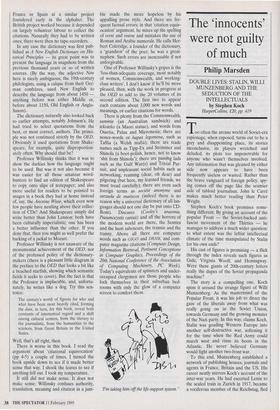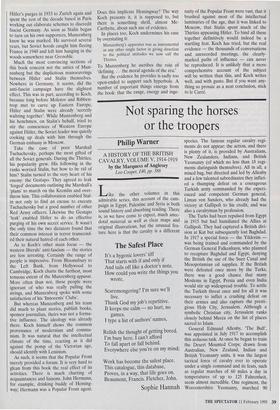The 'innocents' were not guilty of much
Philip Marsden
DOUBLE LIVES: STALIN, WILLI MUNZENBERG AND THE SEDUCTION OF THE INTELLECTUALS by Stephen Koch HarperCollins, £20, pp. 419 Too often the arcane world of Soviet-era espionage, when exposed, turns out to be a grey and disappointing place, its stories inconclusive, its players wretched and deluded, its plots too impenetrable for anyone who wasn't themselves involved. Any information that was gleaned by either side now appears to have been frequently useless or wasted. Rather than the brave vanguard of foreign policy, spy- ing comes off the page like the seamier side of tabloid journalism. John le Carre makes much better reading than Peter Wright.
Stephen Koch's book promises some- thing different. By giving an account of the popular Front — the Soviet-backed anti- fascist movement of the Thirties — he manages to address a much wider question: to what extent was the leftist intellectual climate of the time manipulated by Stalin for his own ends?
His cast of figures is promising — a flick through the index reveals such figures as Gide, Virginia Woolf, and Hemingway. Were these giants of 20th-century letters really the dupes of the Soviet propaganda machine?
The story is a compelling one. Koch spins it around the strange figure of Willi Munzenberg. As the mastermind of the Popular Front, it was his job to direct the gaze of the liberals away from what was really going on in the Soviet Union, towards Germany and the growing monster of the Nazi party. In this way, claims Koch, Stalin was goading Western Europe into another self-destructive war, softening it for the time when the Red Army could march west and rinse its boots in the Atlantic. He never believed Germany would fight another two-front war.
To this end, Munzenberg established a network of publishing houses, journals and agents in France, Britain and the US. His career neatly mirrors Koch's account of the inter-war years. He had escorted Lenin to the sealed train in Zurich in 1917, became a vociferous member of the Reichstag, fled Hitler's purges in 1933 to Zurich again and spent the rest of the decade based in Paris working out elaborate schemes to discredit fascist Germany. As soon as Stalin began to turn on his own supporters, Munzenberg knew he was marked. He survived several years, but Soviet hoods caught him fleeing France in 1940 and left him hanging in the woods somewhere near Grenoble.
Much the most convincing sections of this book concern not the antics of Mun- zenberg but the duplicitous manoeuvrings between Hitler and Stalin themselves. Nowhere in Germany, it seems, did the anti-fascist campaign have the slightest effect. This was in part, according to Koch, because long before Molotov and Ribben- trop met to carve up Eastern Europe, Hitler and Stalin were already 'secretly waltzing together'. While Munzenberg and his henchmen, on Stalin's behalf, tried to stir the consciences of Western Europe against Hitler, the Soviet leader was quietly cooking up deals with him through the German embassy in Moscow.
Take the case of poor Marshall Tuchachevsky, perhaps the most gifted of all the Soviet generals. During the Thirties, his popularity grew. His following in the ranks worried Stalin, but how to be rid of him? Stalin turned to the very heart of his enemy: the Gestapo. They agreed to leak `forged' documents outlining the Marshall's `plans' to march on the Kremlin and over- throw him. This collaboration enabled Stal- in not only to find an excuse to execute Tuchachevsky but a good number of other Red Army officers. Likewise the Gestapo `leak' enabled Hitler to do an effective purging of his own secret service. It wasn't the only time the two dictators found that their common interest in terror transcend- ed their natural hatred of each other.
As to Koch's other main focus — the western liberals' anti-fascism — the stories are less arresting. Certainly the range of people is impressive. From Bloomsbury to the Left Bank, from Hollywood to Cambridge, Koch charts the furthest, most tenuous extent of the Munzenberg apparat. More often than not, these people were ignorant of who was really pulling the strings, and Munzenberg spoke with some satisfaction of his 'Innocents' Clubs'.
But whereas Munzenberg and his team did much to plant stories, publish books, sponsor journalists, theirs was not a forma- tive influence. The ideology was already there. Koch himself shows the common provenance of modernism and commu- nism. It was natural that the intellectual climate of the time, reacting as it did against the pomp of the Victorian age, should identify with Leninism.
As such, it seems that the Popular Front merely provided a forum. It is very hard to glean from this book the real effect of its activities. There is much charting of acquaintances and liaisons. John Hermann, for example, drinking buddy of Heming- way; Hermann was a Popular Front agent. Does this implicate Hemingway? The way Koch presents it, it is supposed to, but there is something shrill, almost Mc- Carthyite, about such use of evidence.
In places too, Koch undermines his case by overstating it:
Munzenberg's apparatus was as instrumental as any other single factor in giving direction to the political attitudes we now call the Thirties.
To Munzenberg he ascribes the role of `defining. . . the moral agenda of the era.' But the evidence he provides is sadly too open-ended to support such hyperbole. A number of important things emerge from the book: that the range, energy and inge- nuity of the Popular Front were vast, that it brushed against most of the intellectual luminaries of the age, that it was linked to Moscow, that Stalin spent much of the Thirties appeasing Hitler. To bind all these together definitively would indeed be a startling feat. Koch has tried, but the real evidence — the thousands of conversations and unrecorded meetings, the clearly- marked paths of influence — can never be reproduced. It is unlikely that a more comprehensive account of the subject will be written than this, and Koch writes well, and with gusto. But if you want any- thing so prosaic as a neat conclusion, stick to le Cane.



























































 Previous page
Previous page